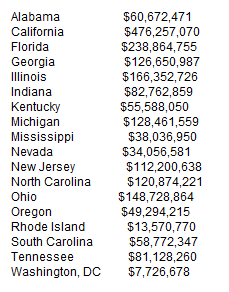A few days after awarding a second round of funding to five states, the Obama Administration announced a $2 billion expansion of its Innovation Fund for the Hardest Hit Housing Markets (the Hardest Hit Fund). At the same time it said that the U.S. Department of Housing and Urban Development (HUD) will initiate a $1 billion complementary program titled the Emergency Homeowners Loan Program to provide assistance to homeowners who are at risk of foreclosure because of a reduction in income due to un-or-under employment or a medical condition.
The Hardest Hit Fund awards money to state housing finance agencies(HFAs) agencies in states that have suffered the double whammy of high unemployment and a drop of more than 20 percent in housing values. Funds can be used for specific programs proposed by the agencies to facilitate short sales or loan modifications for properties that are under water, and for subsidies for persons with temporary financial difficulties while they are looking for a job or undergoing training. Ten states have received awards since the program was announced last February. READ MORE
States that have already received Hardest Hit funds may use the additional money to support unemployment programs previously approved by the Treasury Department or can implement a new unemployment program. States that are new to the program must submit proposals to Treasury by September 1 under guidelines for allowable initiatives.
The new HUD program will provide similar assistance to homeowners in local areas that have been hard hit by loan delinquencies and high unemployment but are not located in the Hardest Hit target states. HUD will work with non-profit and government entities to provide up to $50,000 in zero interest, non-recourse subordinate loans to assist eligible homeowners with mortgage, property tax, and hazard insurance payments for up to 24 months.
In order to qualify for the program the homeowner must:
- Be at least three months delinquent in their payments and have a reasonable likelihood of being able to resume repayment of their mortgage payments and related housing expenses within two years;
- Have a mortgage property that is the principal residence of the borrower, and eligible borrowers may not own a second home;
- Demonstrate a good payment record prior to the event that produced the reduction of income.
HUD will announce further regulations and the names of targeted communities in the next few days.
The additional Hardest Hit Funds will be available to the following states; the proposed allocation is based on the state's size as measured by population.

"We remain committed to helping struggling homeowners, and this program will provide additional assistance to states hit hardest by unemployment," said Assistant Secretary for Financial Stability Herb Allison. "This is part of the Administration's comprehensive housing policy that has helped to stabilize a fragile housing market and allows responsible homeowners the chance to reduce their monthly mortgage payments to affordable levels."
"HUD's new Emergency Homeowner Loan Program will build on Treasury's Hardest Hit initiative by targeting assistance to struggling unemployed homeowners in other hard hit areas to help them avoid preventable foreclosures," said Bill Apgar, HUD Senior Advisor for Mortgage Finance. "Together, these initiatives represent a combined $3 billion investment that will ultimately impact a broad group of struggling borrowers across the country and in doing so further contribute to the Administration's efforts to stabilize housing markets and communities
MORE FROM THE NATIONAL COUNCIL OF STATE HOUSING FINANCE AGENCIES







